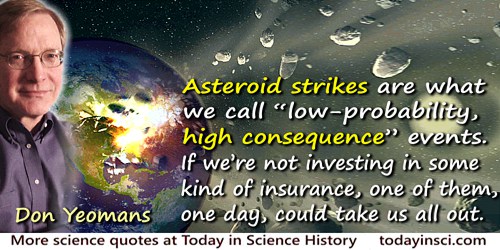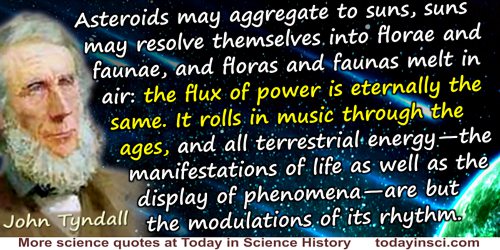Asteroid Quotes (19 quotes)
[Asteroids are] the vermin of the skies.
Asteroids used to be an irritation because they distracted from, or obscured, objects of interest on astronomical photographs. The nickname, used as late as the 1970s-1980s, fell out of use as asteroids themselves were closely studied. As quoted in Fred L. Whipple, Earth, Moon, and Planets (1968), 43.
[There are only three ways to increase our chances against an asteroid aimed at Earth:] Find it early; find it early; find it early.
On Near-Earth Object (NEO) Program at NASA’s Jet Propulsion Laboratory. As quoted in Bridget Mintz Testa, 'Saving the Earth by Inches Per Second', Mechanical Engineering (1 Apr 2014), 136, No. 4, 20.
Newsreader: A huge asteroid could destroy Earth! And by coincidence, that's the subject of tonight's miniseries.
Dogbert: In science, researchers proved that this simple device can keep idiots off your television screen. [TV remote control] Click.
Dogbert: In science, researchers proved that this simple device can keep idiots off your television screen. [TV remote control] Click.
Dilbert cartoon strip (30 Apr 1993).
Almost all of the space program’s important advances in scientific knowledge have been accomplished by hundreds of robotic spacecraft in orbit about Earth and on missions to the distant planets Mercury, Venus, Mars, Jupiter, Saturn, Uranus, and Neptune. Robotic exploration of the planets and their satellites as well as of comets and asteroids has truly revolutionized our knowledge of the solar system.
In 'Is Human Spaceflight Obsolete?', Issues in Science and Technology (Summer 2004).
Among the planets, Jupiter is definitely the solar system’s bad boy in disturbing the motions of all the planets and asteroids[, with] … a “lion’s share” of the mass of the entire planet family….
In Earth, Moon and Planets (1963), 29.
Asteroids are nature’s way of asking, “How's that space program going?”
On Near-Earth Object (NEO) Program at NASA’s Jet Propulsion Laboratory. As quoted in Jeffrey Kluger, 'The Man Who Guards the Planet', Time (9 Jun 2014), 37.
Believe me, this planet has put up with much worse than us. It’s been through earthquakes, volcanoes, plate tectonics, solar flares, sun-spots, magnetic storms, pole reversals, planetary floods, worldwide fires, tidal waves, wind and water erosion, cosmic rays, ice ages, and hundreds of thousands of years of bombardment by comets, asteroids, and meteors. And people think a few plastic bags and aluminum cans are going to make a difference?
In Napalm and Silly Putty (2002), 97.
If one small and odd lineage of fishes had not evolved fins capable of bearing weight on land (though evolved for different reasons in lakes and seas,) terrestrial vertebrates would never have arisen. If a large extraterrestrial object—the ultimate random bolt from the blue—had not triggered the extinction of dinosaurs 65 million years ago, mammals would still be small creatures, confined to the nooks and crannies of a dinosaur's world, and incapable of evolving the larger size that brains big enough for self-consciousness require. If a small and tenuous population of protohumans had not survived a hundred slings and arrows of outrageous fortune (and potential extinction) on the savannas of Africa, then Homo sapiens would never have emerged to spread throughout the globe. We are glorious accidents of an unpredictable process with no drive to complexity, not the expected results of evolutionary principles that yearn to produce a creature capable of understanding the mode of its own necessary construction.
Full House: The Spread of Excellence from Plato to Darwin (1996), 216.
It’s our job to make sure the solar system is well-behaved. Asteroid strikes are what we call “low-probability, high consequence” events. If we’re not investing in some kind of insurance, one of them, one day, could take us all out.
On Near-Earth Object (NEO) Program at NASA’s Jet Propulsion Laboratory. As quoted in Jeffrey Kluger, 'The Man Who Guards the Planet', Time (9 Jun 2014), 36.
Noise proves nothing. Often a hen who has merely laid an egg cackles as if she laid an asteroid. — Pudd’nhead Wilson’s New Calendar
Epigraph to Chap. 5, In More Tramps Abroad (1897), Vol. 1, 40. Also published under the title Following the Equator (1897).
Of the 10,000 or so meteorites that have been collected and analyzed, eight are particularly unusual. They are so unusual, in fact, that since 1979 some investigators have thought they might have originated not in asteroids, as most meteorites did, but on the surface of Mars.
In Scientific American, (Dec 1986), 255, 80.
Over very long time scales, when the perturbing influences of both Jupiter and Saturn are taken into account, the seemingly regular orbits of asteroids that stray into the Kirkwood gaps turn chaotic. For millions of years … such an orbit seems predictable. Then the path grows increasingly eccentric until it begins to cross the orbit of Mars and then the Earth. Collisions or close encounters with those planets are inevitable.
In article 'Tales of Chaos: Tumbling Moons and Unstable Asteroids", New York Times (20 Jan 1987), C3.
Owing to their [minor planets or asteroids] small size; … The force of gravity on their surfaces must be very small. A man placed on one of them would spring with ease 60 feet high, and sustain no greater shock in his descent than he does on the Earth from leaping a yard. On such planets giants may exist; and those enormous animals which here require the buoyant power of water to counteract their weight, may there inhabit the land.
In Elements of Astronomy (1870), 153. The ellipsis reads “the largest minor planet is but 228 miles in diameter, and many of the smaller ones are less than 50.”
The law of conservation rigidly excludes both creation and annihilation. Waves may change to ripples, and ripples to waves,—magnitude may be substituted for number, and number for magnitude,—asteroids may aggregate to suns, suns may resolve themselves into florae and faunae, and florae and faunae melt in air,—the flux of power is eternally the same. It rolls in music through the ages, and all terrestrial energy,—the manifestations of life, as well as the display of phenomena, are but the modulations of its rhythm.
Conclusion to lecture 12 (10 Apr 1862) at the Royal Institution, collected in Heat Considered as a Mode of Motion: Being a Course of Twelve Lectures (1863), 449.
There’s very good news from the asteroids. It appears that a large fraction of them, including the big ones, are actually very rich in H2O. Nobody imagined that. They thought they were just big rocks … It’s easier to get to an asteroid than to Mars, because the gravity is lower and landing is easier. Certainly the asteroids are much more practical, right now. If we start space colonies in, say, the next 20 years, I would put my money on the asteroids.
As quoted in Kenneth Brower, 'The Danger of Cosmic Genius', The Atlantic (Dec 2010).
To Nature nothing can be added; from Nature nothing can be taken away; the sum of her energies is constant, and the utmost man can do in the pursuit of physical truth, or in the applications of physical knowledge, is to shift the constituents of the never-varying total. The law of conservation rigidly excludes both creation and annihilation. Waves may change to ripples, and ripples to waves; magnitude may be substituted for number, and number for magnitude; asteroids may aggregate to suns, suns may resolve themselves into florae and faunae, and floras and faunas melt in air: the flux of power is eternally the same. It rolls in music through the ages, and all terrestrial energy—the manifestations of life as well as the display of phenomena—are but the modulations of its rhythm.
Conclusion of Heat Considered as a Mode of Motion: Being a Course of Twelve Lectures Delivered at the Royal Institution of Great Britain in the Season of 1862 (1863), 449.
To set foot on the soil of the asteroids, to lift by hand a rock from the Moon, to observe Mars from a distance of several tens of kilometers, to land on its satellite or even on its surface, what can be more fantastic? From the moment of using rocket devices a new great era will begin in astronomy: the epoch of the more intensive study of the firmament.
(1896). As quoted in Firmin Joseph Krieger, Behind the Sputniks: A Survey of Soviet Space Science (1958), 23.
We could choose to do it now. We could choose to protect ourselves from asteroids and comets rather than from each other.
Concluding remark for Ch. 23, 'Comets May Be Dangerous For Your Health', The Mystery of Comets (1985), 249.
What happens if a big asteroid hits Earth? Judging from realistic simulations involving a sledge hammer and a common laboratory frog, we can assume it will be pretty bad.
In Geoff Tibballs, The Mammoth Book of Zingers, Quips, and One-Liners (2004), 502.
![Walter Baade quote: [Asteroids are] the vermin of the skies.[Asteroids can block objects of interest on astronomical photographs](https://todayinsci.com/B/Baade_Walter/BaadeWalter-Vermin500x250px.jpg)


 In science it often happens that scientists say, 'You know that's a really good argument; my position is mistaken,' and then they would actually change their minds and you never hear that old view from them again. They really do it. It doesn't happen as often as it should, because scientists are human and change is sometimes painful. But it happens every day. I cannot recall the last time something like that happened in politics or religion.
(1987) --
In science it often happens that scientists say, 'You know that's a really good argument; my position is mistaken,' and then they would actually change their minds and you never hear that old view from them again. They really do it. It doesn't happen as often as it should, because scientists are human and change is sometimes painful. But it happens every day. I cannot recall the last time something like that happened in politics or religion.
(1987) -- 


